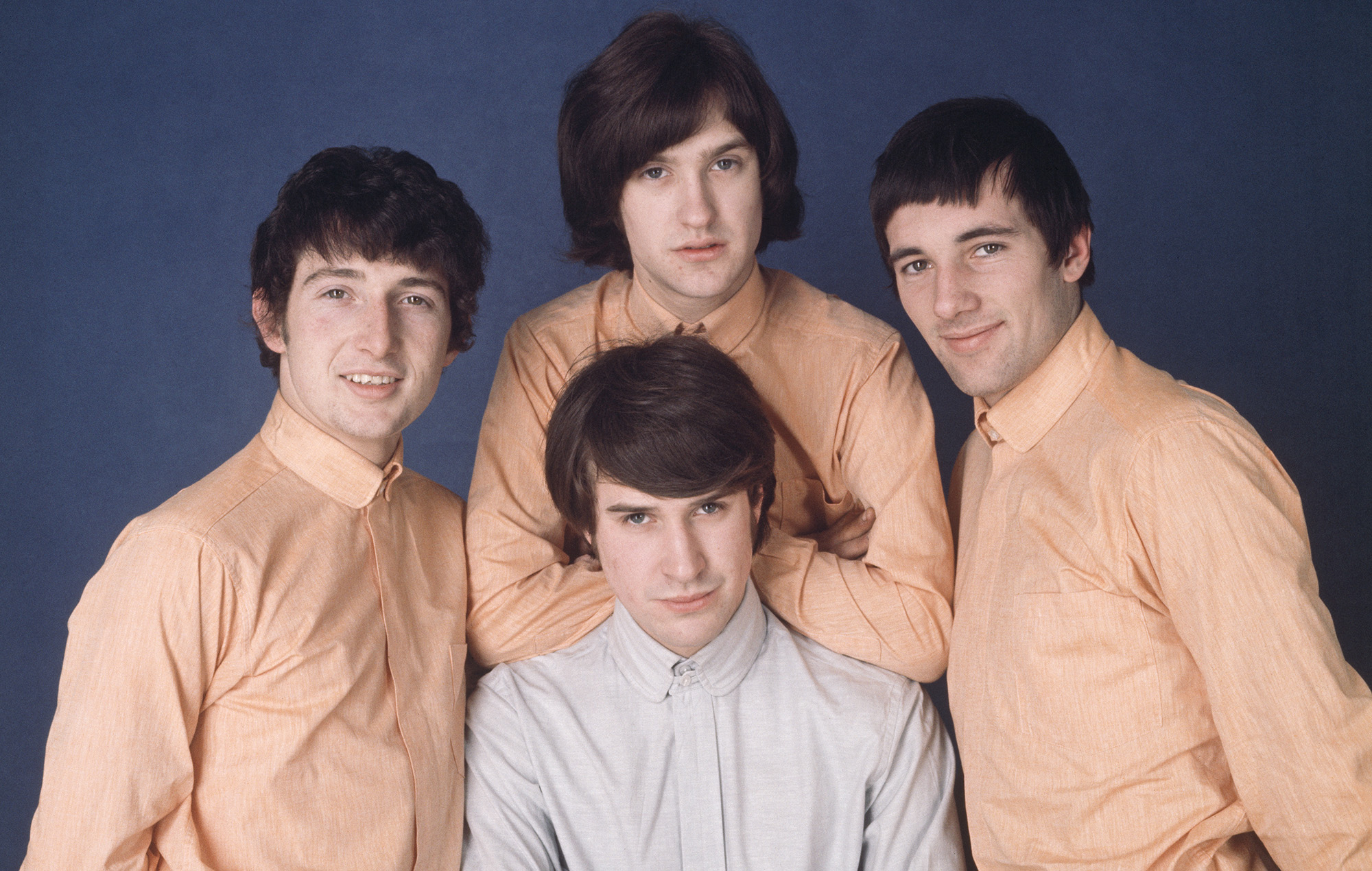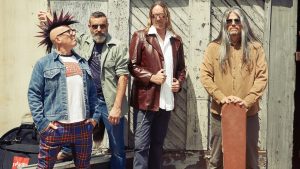“It’s a difficult thing to talk about,” Ray Davies admits of the shooting that hospitalised him in New Orleans in 2004.
He and a friend were walking home from dinner when a mugger attacked them both, threatening the woman with a gun before taking her handbag and piling into a getaway car. In a moment of madness, Ray chased after the assailant, who turned, aimed the gun and shot him in the leg at point-blank range.
Davies recounted the tale in his elegiac 2013 memoir Americana: the Kinks, the Road and the Perfect Riff. Asked how it felt to relive the terrifying incident in prose, he replies slowly and deliberately.
It was “cathartic,” he says, because he “didn’t feel like the good guy” when he replayed the scene on the page. “Just before he shot me, he looked afraid – and he had a gun. You know, I was thinking of the world he came from, the challenges in his life…” When NME suggests not many people have seen that look, he says quietly: “It’s utter desperation.”
Ray Davies has been weaving novelistic narratives steeped in empathy for six decades now. Usually, though, his medium is the four-minute rock song. As chief songwriter with The Kinks, the band he formed north London in 1963 with his younger brother Dave on guitar, he’s captured teenage lust (landmark breakthrough single ‘You Really Got Me’), wistful nostalgia (‘Waterloo Sunset’) and the sexual liberation of the swinging ‘60s (‘Lola’).
These classic tracks and many – many – more appear on ‘The Journey’, an innovative compilation released in two parts this year, marking The Kinks’ 60th anniversary (‘Part 2’ is due this week). Rather than being arranged in simple chronological order, each album is split into chapters that represent different themes, with the remastered songs grouped accordingly. It charts the Davies’ rise from working-class, postwar London to the spoils of rock stardom, speaking to The Kinks’ status as one of the most revered British bands ever, icons of the ‘60s who stood shoulder-to-shoulder with the Beatles and the Rolling Stones.
It’s also a reminder of their eclectic style, which morphed from spit-and-sawdust R&B to complex concept albums, a shift that began with 1968’s ‘The Kinks Are The Village Green Preservation Society’. The record sold poorly upon release and Dave thought it would be their last, but it went on to be considered their masterpiece. By the 1980s, they were filling arenas with bombastic hard rock. What was it like to revisit such a formidable back catalogue?
“It was great,” Dave tells NME. “At first, when Ray suggested it, I thought: ‘Oh no – not this.’ [But] when you hear the songs again, you’re kind of there in the moment. It’s amazing… like watching a film about a period of time – you’re reliving that moment. You think, wow – this really happened?”
English rock group The Kinks, from left, Mick Avory, Dave Davies (playing a Gibson Flying V guitar), Pete Quaife and Ray Davies, perform on the music television show Top Of The Pops at BBC Lime Grove Studios in London on 18th May 1967. (Photo by David Redfern/Redferns)
A lot has, indeed, happened since 1963. The Kinks continued to knock out albums together until 1993’s ‘Phobia’, when the group drifted apart. The Davies’ have been the only consistent members of the band, though drummer Mick Avory served the second-longest from 1964 to 1984, when he left under a cloud.
Acrimony has long defined the Kinks: the brothers’ inter-band sibling rivalry predated Liam and Noel by some three decades. Avory, meanwhile, notoriously nearly killed Dave with a drum pedal in an onstage bust-up in 1965. All three members, now in their late seventies, contributed to a track-by-track breakdown on the new albums’ liner notes, so it seems tempers have cooled. Perhaps notably, though, NME chats to the trio over three separate phone calls: first Dave, then Ray and finally Mick.
In his 2022 memoir Living on a Thin Line, Dave described the latter as “a third brother”. Asked if it felt that way to him, Avory chuckles: “In the fact that we’re always arguing, yeah… It’s mellowed down, but back then it was so volatile, you know? Things could really go off like a flipping balloon going up at a moment’s notice… I was the brother in between. You couldn’t agree with one too much or else you’d lose face with the other.
The Kinks cast a long shadow over Britpop, with their observational style a strong influence on Damon Albarn. “[‘There were] similarities with Blur around that time,” notes Ray, “and it’s nice to be cited for writing certain music.”
Arguably the most obvious nod, though, came from Oasis, whose 2005 track ‘The Importance of Being Idle’ bears more than a passing resemblance to The Kinks’ ‘Dead End Street’. They even imitated its black-and-white music video, which sees the band carry a coffin through cobbled backstreets. Surprisingly, Ray hasn’t ever chanced upon the Oasis track or seen its video. When we break down the similarities, his jokey response is succinct: “Cheeky bastards!”
Ray has kept up with more recent music, though, and told Channel 4 in 2018: “I love grime.” Today, he explains: “[Rap] is spoken-word. The way the dialogue can take over… if you’ve got something to say, it’s a great medium. It depends where you come from. You’ve got your voice and your background and where you come from.”
This is in stark contrast to the Stones’ swashbuckling guitar pirate Keith Richards, who recently sassed: “I don’t really like to hear people yelling at me and telling me it’s music – AKA rap.” Ray laughs: “And he works with Mick Jagger!?” He sympathises with Keef’s opinion, but gently disagrees: “You’ve got to have a voice so that you can struggle to get yourself out [of your situation]. So it reflects society, really… It’s part of the world, part of history.”
It’s no surprise that Ray Davies identifies with artists who evoke their era: the Kinks did the job so well that they closed the NME Awards (then known as the NME Poll Winners Concert) in 1965. This was just over a year after the release of their debut single, a bluesy take on Little Richard’s ‘Long Tall Sally’. Unfortunately, they were preceded on the bill that night by a band with a slightly bigger following: the Fab Four.
“It mucked it up for us, really,” remembers Mick, still sounding crushed by the experience 58 years later. “We were still cutting our teeth on stage shows and we had to go on after the Beatles so that they could leave the building without getting pulled to pieces… Half the sound system wasn’t working because all the sound guys thought that was the end of the concert. Which it should have been! It was awful.” Of the Kinks’ live inexperience, he notes ruefully: “We could have done with a run in Hamburg for about eight months.”
Avory chats to NME the day after the release of the Beatles’ ‘final’, AI-assisted single ‘Now and Then’. While he might not be blown away by the tune (“It’s alright, but it’s nothing really different for them”), there does seem to be something of a ‘60s revival underway. Just look at the Stones, who recently sashayed to Number One with their comeback album ‘Hackney Diamonds’.
Ray approves of ‘Angry’, its lead single, while talk of the band leads Dave to recall his friendship with their founding member Brian Jones, who died in 1969: “He had an innate ability… I think he was a bit of a magician, pulling a flower out of a hat. I think that being a writer and musician is like being a magician.”
Dave speaks of creativity with childlike wonder. “What’s amazing about writing,” he says, “[is that] you don’t always know what you’re writing about. Am I writing about the future? Am I writing about the past? What am I writing about? And I think Ray has always had a knack of pulling things through time. And that’s so weird – but life’s weird!”
Group portrait if The Kinks, circa 1965. L-R Dave Davies, Pete Quaife, Ray Davies, Mick Avory. (Photo by GAB Archive/Redferns)
Jagger and the gang made a massive return to UK stadiums in 2018, when Ray was promoting his solo album ‘Our Country: Americana Act 2’. In the aforementioned Channel 4 interview, he claimed to be in the process of reforming the Kinks, “inspired by the Rolling Stones”. There was even talk of new material, which caused something of a stir among fans. And then… tumbleweed. What happened?
Ray, who can be cryptic at the best of times, squirms around the topic as if we’re asking for the keycode to his safe deposit box. “Well,” he says, “it got shelved because of… other issues. But there’s still material there. When I get time.” By-by-bit, gnomically, he reveals that he’s been recording the “home demos” in question since the ‘90s. Mick and Dave have contributed to the tracks, too (the drummer later describes them as a mixture of their “punchy” arena rock and “mid-tempo rock ballads”). The songs are “in bits”, Ray says: “We’ve got loads of songs there in pieces.”
How many songs?
“…About 20.”
No!
He seems to be enjoying the game: “Yeaaaah!”
And how close to completion are the new Kinks tracks?
“There are about two or three songs I want to finish,” he says, “and when they’re finished, I’ll put the whole thing together.”
A full reunion, insists the elder Kink, remains “in the lap of the gods”. Dave suffered a near-catastrophic stroke in 2004, the year that Ray was shot, and it prevented him from releasing music for almost a decade. The band last played Glastonbury together in 1993 (though Ray performed the Legends Slot in 2010); but it would be so sweet to see both brothers crunching out ‘You Really Got Me’ on Worthy Farm. Ray doesn’t balk at the prospect, but says it would hinge on “getting a show that gives us the credit we deserve”.
Before we can get our change.org petitions going, though, Ray needs to “persuade [Dave] to come on”. In his conversation with NME, the guitarist explains that the two intend to meet very soon, and entertains the possibility of working on new music. But Ray’s wary: “You’ve gotta be careful because he’ll run off in one direction and I’ll [run] in mine… He’s like that. He stays in control.” You can imagine the twinkle in his eye when he adds: “I’m just a well-meaning big brother.”
The Davies’ dispute is a puzzle. Look at footage of Liam and Noel in the ‘90s and you can see how they might wind each other up, but Ray and Dave seem so genial. What gets between them? “We’re just different animals,” sighs Dave. “We found ourselves at a very young age being in each other’s faces. And we had to work with it somehow.”
After all they’ve been through, it would be glorious for the Kinks to close one chapter with ‘The Journey’, only to start another. As Dave observed, when he remembered thinking ‘…The Village Green Preservation Society’ would be the end of the band: “It was an ending, but as with all endings, they are also beginnings.”
The Kinks’ ‘The Journey Part 2’ is out November 17
The post The Kinks on 60 years of sibling rivalry: “We’re just different animals” appeared first on NME.




